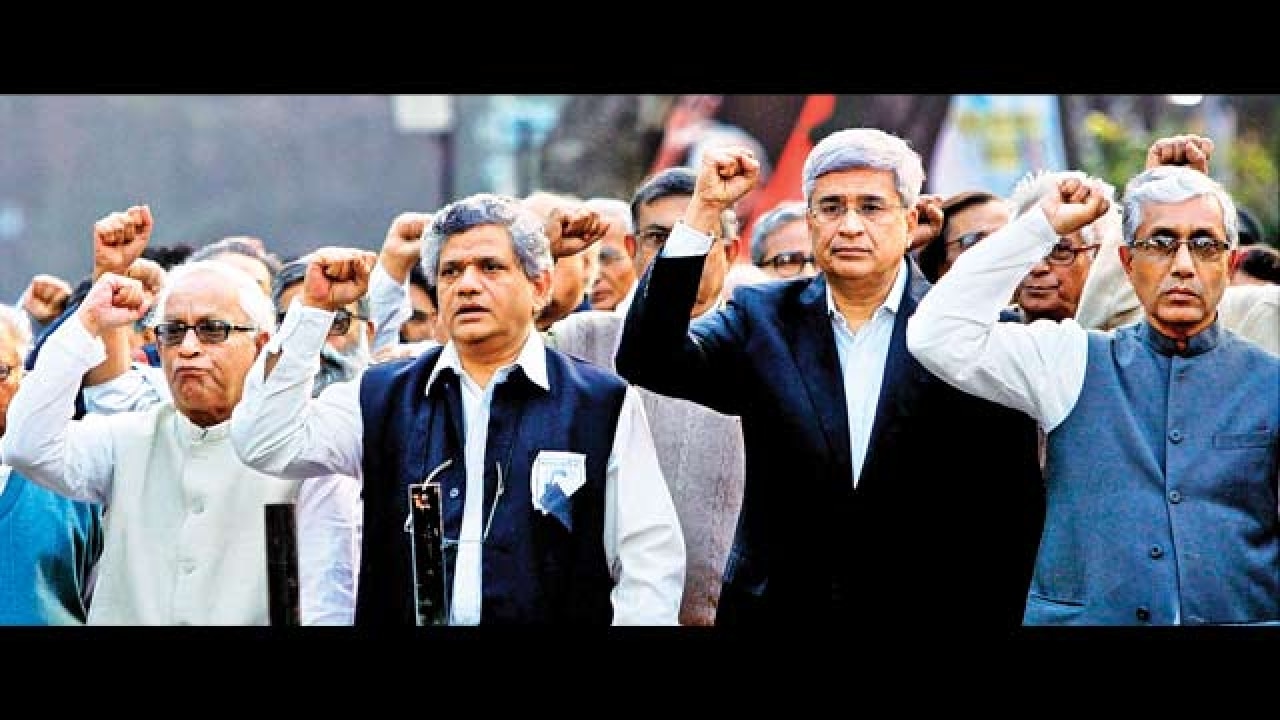
Biggies of the AK Gopalan Bhavan, national headquarters of the Communist Party of India-Marxist (CPI-M), India’s largest Leftist party with 10,48,678 members (an addition of 14770 to the membership roll of 2010), has permitted its West Bengal unit to appeal to the Congress for electoral alliance in the state assembly elections, due within three months on the plea of combating the All India Trinamool Congress’ (AITMC) regime of ‘terror and violence’ against its cadres. This was announced at a press conference just after the party’s Organisational Plenum — albeit metaphorically and not openly — by hardliner Prakash Karat.
This nod tramples upon the categorical mandate — para 2.69 of the Political Resolution (PR), adopted at the party’s 21st Congress (Visakhapatnam, April 14-19, 2015): “The Party will have no understanding or electoral alliance with the Congress” as the ‘neoliberal policies’ of the Congress-led UPA government and its “anti-people policies and massive corruption helped the BJP to acquire popular support”. The PR is the rule book for Leninist parties like the CPI(M) and CPI between two congresses. In fact it sets out the bounds within which the party has to function until the next congress.
From the party’s first Congress after the split — Seventh Congress (October,1964), the CPI(M) has been theoretically and tactically shifting its position. The party leadership chases events instead of envisioning events. The political-organisational report (POR) at the 16th Congress (Calcutta,1998) revealed that the para 112 of the first party programme was incorporated by an amendment (no 118) somewhat in a tearing hurry as the state assembly elections of Kerala was then round the corner. What would the state committee of Kerala do if CPI (then it claimed to be the main CPI, later forced to rechristened as CPI-Marxist when the Election Commission of India refused to allot the new party the electoral symbol — sickle and a bunch of corn — and instead allotted to the other party, CPI), had won the majority? This revelation is in the details of the debate at the Congress: ‘On the question of participation in the government’ (forced by Jyoti Basu’s explosive ‘historic blunder’ comment after the party’s decision not to form the centre-Left United Front government in 1996). The minority group led by the then party secretary Harkishan Singh Surjeet and Basu, disclosed this, in its note in defence of joining the United Front ministry in which Basu was offered the post of Prime Minister.
The CPI(M) has since 1964 been charting a path of tail-ism of eventualities that reflects a reformist swing ‘parliamentary cretinism’(famously coined by Karl Marx in (chapter V of the Eighteenth Brumaire of Louis Bonaparte, published in 1852). At the Ninth Congress (Madurai July 1972), the party adopted the slogan of Left Democratic Front, shelving People’s Democratic Front. Furthermore, at the 13th Congress (Thiruvananthapuram, December 1988-January 1999), CPI(M) shifted from its hardcore Leftist (read Stalinist) position and virtually reworded the call of CPI (8th Congress, Patna, 1968) — Left, democratic and secular alternative.
India’s largest Leftist party — at least in the parliamentary arena — the CPI(M) has been adopting a path of rightward compromise. The irony of history is that one of the reasons for splitting the CPI in 1964 was the pro-Nehruvian stance of what it called the ‘right CPI’ comprising Dangeites or ideological followers of Shripad Amrit Dange, while now the mandarins of AKG Bhavan woo the Congress that dumped almost everything Nehruvian in economic sphere and embraces neoliberalism. The hypocrisy of the CPI(M) brass is felt if one looks at the Resolution on Plenum at the Organisational Plenum (27-31 December 2015): “The embracing of neoliberalism by the Indian ruling classes and accompanied efforts to reduce India to being a subordinate ally of imperialism.”
How can one forget how Surjeet and his faithful junior colleague in the politburo in the mid-1990s kow-towed to the fodder scam-tainted Rashtriya Janata Dal (RJD) supremo Lalu Prasad Yadav in the hope of winning one or two assembly seats in Bihar and for that they pitted themselves against its closest ally, the CPI? The giganticism of hypocrisy is imprinted in the 111-page Report on Organisation: “Parliamentarism is a reformist outlook that confines the Party’s activities to electoral work and fosters the illusion that the Party’s advance can be ensured mainly through fighting elections. This leads to the neglect of the work of organizing mass movements (para 1.151). It is “also responsible for the undermining of the proper implementation of the political and organisational tasks set out by the Party (para 1.147.)
However, the 26000-plus Plenum admits, perhaps it is forced to do so, that parliamentarism has degenerated into a vice. “The states have reported on the various ways parliamentarism has manifested. There is a growing desire among some Party cadres to contest elections. They demand to contest elections in places where there is no basis to contest. When certain cadres have not been allowed to contest, they have expressed their displeasure by not working during the election. In some cases there has been defiance of the Party decision, especially at the level of the local bodies election.” (para 1.148). The next para is even more revealing: “The Telangana and Andhra Pradesh committees have reported instances of Party candidates spending money and resorting to methods of the bourgeois parties. With the aim of contesting elections, some have indulged in groupism and factional activities. The other aspect of parliamentarism is that elected representatives do not rely on mass struggles or keep in touch with the organized activity of the Party and concentrate only on their electoral constituencies work.”
All this shows that there has been a ‘routinism’ (a term used in the Plenum document) in the PS of every congress from the mid-1990s in one or two paragraphs on “ongoing rectification programme”. It reiterates now that rectification should have been more focused on curbing parliamentarism. Friedrick Engels stated prophetically, “Parliamentary cretinism’ is an incurable disease”.
The writer is a veteran journalist & commentator